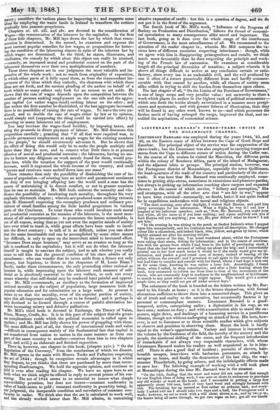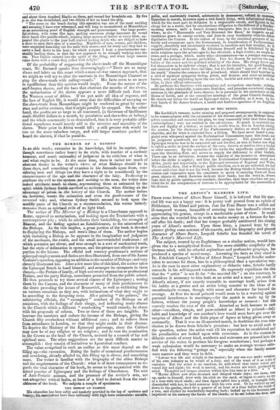LIEUTENANT BARNARD'S THREE-TEARS CRUISE IN THE MOZAMBIQUE CHANNEL.
LIEUTENANT BARNARD was employed during the years 1844, '45, and '46, on the Eastern coast of Africa between the Cape of Good Hope and Zanzibar. The principal object of the service was the suppression of the slave-trade; but the Lieutenant was also employed in carrying troops and stores from the Cape to different scenes of action during the Caffre war. In the course of his cruises he visited the Mauritius, the different ports within the colony of Southern Africa, parts of the island of Madagascar, and the adjacent islets or groups. The principal station, however, was the Portuguese district of Mozambique, especially the town Quillimane, the head-quarters of the trade of the country and particularly of the slave- trade. It was here that Mr. Barnard was continually employed, some- times in getting ship-stores, sometimes in excursions and pleasure-parties, but always in picking up information touching slave cargoes and expected slavers : in the course of which service, "bribery and corruption," fibs and stratagems, with all the other arts that "are fair in war,'-appear to have been exercised—necessarily, no doubt, butiti 11 not quite looked" for in expeditions undertaken with moral and religious objects. "The next morning, soon after daylight, I visited Said Hamza, and paid him thirty sovereigns for his information. What a fright„he was in! and how I laughed at his ludicrous speeches, such as, Now, Mr. Barnard, you make your face white, all the same as if you hear nothing; and epose anybody ask you if Said Ramat tell you anything; you say, He, poor fellow! what he know? I not ask him.'
"In the evening he was sitting in the porch at Senhor Isidore's when I popped upon him unexpectedly, and his confusion was beyond all description. He changed colour like a chameleon, and looked black, blue, yellow, and green by turns; Mach highly amused me after his morning lecture. "In the course of the day, I as usual wandered about, whilst the Portuguese were taking their siesta, fishing for information; and in the coarse of conversa- tion with the person from whom I had been in the habit of purchasing stock, I found that she bad been accused of telling me about the brig; and I immediately pointed out to her how mach better it would be if she really would give me in- formation, and pocket a good round sum of money, instead of bearing all the odium without the reward: and I promised to call again in the evening after she had had time to consider and consult with her friend, whom I had kept a look-out on for some time, knowing he was rather a loose fish. Accordingly, I found them, when I called, in deep consultation; and after a little beating about the bush, they consented to inform me from time to time of the movements of the slaves, who are constantly kept in readiness in the neighbourhood of Qaillimane, to march to any point where a vessel might appear. This would give a cruiser ample time, as they could not get off under several days."
The substance of the book is founded on the letters written by Mr. Bar- nard to his friends at home ; or it is the letters themselves, with formal alterations sufficient to throw them into a connected shape. This gives an air of truth and reality to the narrative, but occasionally flattens it by personal or commonplace matters. Lieutenant Barnard i a good- tempered, active, enterprising sailor; a diplomatist in his way, as we have seen; zealous on duty ; and witha constitution able to stand the ex- posure., night dews, and duckings of a harassing service in a pestiferous climate, though not without undergoing an attackof fever. His turn, how- ever, is not to literature or to those scientific studies which give subjects to observe and precision in observing them. Hence the book is hardly
equal to the writer's opportunities. Variety and interest is imparted to the volume by the freshness of the field, the novelty of the scenery and the people, the continual shifting of the scene, and the frequent introduction of remarkable if not always very respectable characters, with whom Lieutenant Barnard makes his readers as well acquainted as he is him- self. There is also a good deal of incident; pursuits of slavers, hair- breadth escapes, interviews with barbarian potentates, an attack by savages on boats, and finally the destruction of his last ship, the war- steamer Thunderbolt, by going ashore, and the indefatigable efforts made to save her. The following example of working with a will took place at Mozambique during the time Mr. Barnard was in the steamer.
"On the 14th, finding that the wood and water did not come off fast enough for our English Ideas of doing work, I was sent on shore to endeavour to purchase any old wrecks or wood on the beach; and I succeeded in getting a large dow apparently about 100 tons, built of very hard wood and strongly fastened with iron. The breaking her up seemed at first rather an arduous task, and every- body I asked told me I should take two days and a half, the Portuguese said a week: however, we set to work with a will about eleven a. m., and by two p. in., the beams being all sawn through, we got two ropes on her; got all our hands
and about three hundred Blacks on them, and roused her broadside oat. By five p.m. she was demolished, and two-thirds of her on board the ship.
"The scene on the beach during this operation was one of the most exciting SOO amusing I have ever witnessed, and will long be remembered at Mozambique as aft astonishing proof of English strength and perseverance. Our large power- ful stokers, with arms like legs, making enormous sledge-hammers fly round their heads like paddle-wheels, rending large masses of timber at every blow, ap- peared like giants to the poor half-starved looking devils who are obliged to have a slave to open their eyes of a morning. Hundreds of men, women, and children, were employed knocking out the nails with stones; and for every nail they had to
carry a down to the boat; for which purpose I kept a quartermaster con- stantly loading them, so that the dew appeared to be actually walking into the sea. Poor Darkie entered into the spirit of the thing, and when large masses mime down with a crash they yelled with delight."
Of the probability of suppressing the slave-trade off the Mozambique coast, Mr. Barnard speaks thus discouragingly—" There are so many rivers and inlets on this coast which a man-of-war cannot approach, that we might as well try to alter the currents in the Mozambique Channel as stop the slave-trade with sailing-vessels." His facts seem to us more in equilibrium than this opinion would imply. From the nature of the surf-beaten shores, and the bars that obstruct the mouths of the rivers, the embarkation of the slaves appears a more difficult task than on the Western coast of Africa. If we put aside all idea of expense, and the loss of English life, it would seem that the difficulties of carrying on the slave-trade from Mozambique might be rendered so great by nume- rous and active cruisers, that it might possibly be stopped. On the other hand, the profits are so large to all concerned, (a Governor of Quillimane made 60,000 dollars in a month, by peculation and slave-fees or bribes,) and the whole community is so demoralized, that it is very probable addi- tional squadrons would merely add to the miseries and mortality of the slaves. Their price in Africa would fall; a still greater risk would be run on the more valueless cargo, and still larger numbers packed on board the slavers, if that be possible.



























 Previous page
Previous page